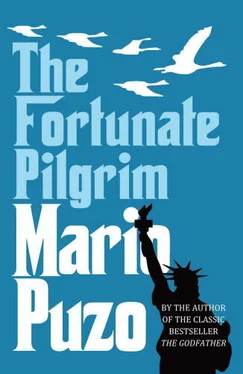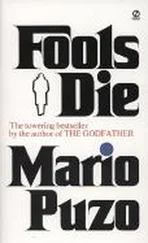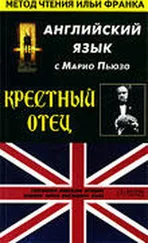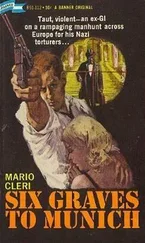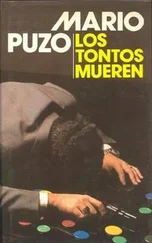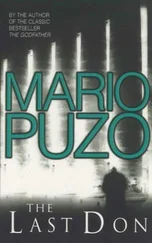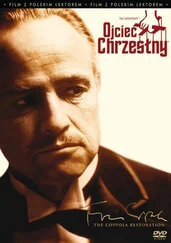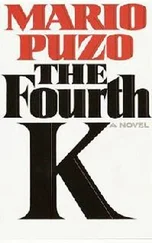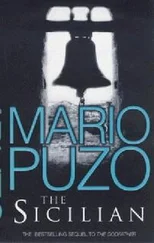And then the most shameful: only a year after her husband’s death, only six months after the birth of that dead husband’s son, she—a grown woman—had for the first time in her life become passionate about a man, the man who was to become her second husband. In love. Not the spiritual love of young girls or priests; not the emotion for heroes in romances that could be told to a young girl. No; love was the word for the hot flesh, the burning loins, feverish eyes and cheeks. Love was the feel of turgid, spongy flesh. Ah, what madness, what foolishness for the mother of children. Thank Jesus Christ in heaven she was beyond that now.
And for what? Frank Corbo was thirty-five, never married; slender, wiry, and with blue eyes; considered odd for being unwedded at that age, odd also in his reticence, his silent nature and lonely pride—that pride so ludicrous in those who are helpless before society and fate. The neighbors, searching for a widow’s mate and feeder of four hungry mouths, thought him capable of any foolishness and a fine candidate. He worked steadily on the early morning shifts of the railroad gangs, and his afternoons were free for courting. There would be no scandal.
So the neighbors, out of kindness and self-preservation, brought them together, with conscience clear that both would make a good bargain.
The courtship was surprisingly young and innocent. Frank Corbo knew only the quick, cold whore’s flesh; he would come to a marriage bed fresh with love, with a boy’s eagerness. He pursued the mother of the three children as he would a young girl, making himself even more ridiculous in the eyes of the world. In the late afternoons he visited her as she sat before the tenement, guarding her playing and sleeping children. Sometimes he would take supper with them and leave before the children were put to bed. Finally one day he asked Lucia Santa to marry him.
She gave him an arch look, treating him like a young boy. She said, “Aren’t you ashamed to ask me, with a baby still in the carriage from my first husband?” And for the first time she saw that dark look of hate. He stammered out that he loved her children as he loved her. That even if she did not marry him he would give her money for the children. In fact, he made good money on the railroad and always brought the children ices and toys. He had sometimes even given her money to buy the children clothing. At first she had tried to refuse, but he had become angry and said, “What is it, you don’t wish to be friends with me? You think I’m like other men? I don’t care for money—” and started to tear up the dirty green bills. For some reason this had brought tears to her eyes. She had taken the money from him, and he had never presumed on his gifts. It was she who became impatient.
ONE SUNDAY IN spring, invited, Frank Corbo came to the midday meal, the feast of the week for Italian families. He brought with him a gallon of biting homemade Italian wine and a box of cream pastries, gnole and soffiati. He wore a shirt, a tie, a many-buttoned suit. He sat at table with children about him: shy, awkward, more timid than they.
The spaghetti was coated with Lucia Santa’s finest tomato sauce, the meatballs were beautifully round and peppered with garlic and fresh parsley. There was the dark green lettuce with olive oil and red wine vinegar, and then walnuts to eat with the wine. Everything had a bite to it of herbs and garlic and strong black pepper. They all stuffed themselves. Finally the children went down to the street to play. Lucia Santa should have kept them with her in the house to avoid scandal, but she did not.
And so in the golden afternoon with sunlight streaming through the long railroad flat, with the poor infant Vincenzo’s eyes shielded from sin by a conveniently placed pillow, they sealed their fate on the living room couch, the mother only slightly distracted by her children’s voices rising sweetly from the street below.
Ah, delight, delight, the taste of love. After so long an abstinence the animal odor was an aphrodisiac, a bell to ring in the coming joy; even now, so many years later, the memory was fresh. And in that act of love she had been the master.
The man so harsh, so strong against the world, had wept on her breast, and in the fast-fading sunlight she understood that in all his thirty-five years of life he had never received a caress with real tenderness. It was too much for him. He had changed afterwards. He had come too late to love, and he despised his weakness. But for that one afternoon she forgave him many things, not everything; and cared for him as she had never cared for her first husband.
There was very little trouble until his first child was born. His natural love for Gino became cancerous, murdering his love for wife and stepchildren, and he became evil.
But in the first year of marriage, in the trust of love, he told her of his childhood in Italy as the son of a poor tenant farmer. He had often been hungry, often cold, but what he could never forget was that his parents made him wear cast-off shoes which were too small. His feet became horribly deformed, as if every bone had been broken and then bound together in one grotesque lump. He showed her his feet as if to say, “I keep nothing from you; you needn’t marry a man with such feet.” She had laughed. But she did not laugh when she learned that he always bought twenty-dollar shoes, beautiful brown-grained leather. The act of a true madman.
His parents were a rarity in Italy, drunken peasants. They relied on him to work the farm and give them their bread. When he fell in love with a young girl of the village, the marriage was forbidden. He ran away and lived in the woods for a week. When they found him, he was little more than an animal. He was in shock and was committed to a mental institution. After a few months he was released, but he refused to return to his home. He emigrated to America, where in the densest city in the world he lived a life of the most extreme loneliness.
He took care of himself; he never became ill again. In his life of solitude and hard work he found safety. As long as he did not become emotionally entangled with other human beings, he was safe, as something immobile is to some degree safe from the dangers of motion. But this love which brought him back to life brought him back to danger, and perhaps it was this knowledge, animal-like, felt rather than known, that had made him so weak that Sunday afternoon.
Now, after twelve years of life together, the husband was as secretive with her as he had always been with other people.
SOMEONE HAD COME in the door. Someone was moving in the kitchen. But the footsteps went out again and down the stairs. For his own mysterious reasons, her husband had gone back into the street.
Night. Night. She wanted her husband in her bed. She wanted her older son in the house. She wanted everyone asleep in this safe tenement castle four stories above the ground, sealed against the world by brick and concrete and iron. She wanted everyone asleep, asleep in darkness, safe from life, so that she need no longer stand guard, could deliver herself up to oblivion.
She sighed. There was no recourse. Tomorrow she must quarrel with Frank to keep the janitor’s job. She must settle the Le Cinglata hash, the children’s clothes, the stove to boil the laundry soap. She listened to the breath of the sleeping children all around her—Lena in her bed, the three boys in the room separated from hers only by an archway, Octavia in the bedroom with its door open for air. She made her breath fall into their great rising and falling sighs, and then she was asleep.
OCTAVIA STRETCHED OUT on her narrow bed. She wore her rayon slip as a nightdress. The room was too small for any additional furniture except a tiny table and a chair, but it had a door she could close.
Читать дальше
